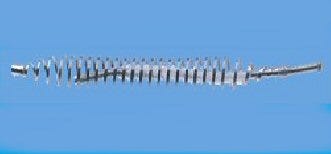Are Bayer, FDA Dragging Their Feet on Essure?
August 30, 2016
Activists who claim they were injured by the device are pressing FDA for action.
Nancy Crotti
 Six months have passed since FDA ordered Bayer AG to put a "black box" warning on the labels of its controversial Essure sterilization device, and activists are asking why it hasn't happened yet.
Six months have passed since FDA ordered Bayer AG to put a "black box" warning on the labels of its controversial Essure sterilization device, and activists are asking why it hasn't happened yet.
A group of activists called the Essure Sisters intends to lobby the U.S. Senate in mid-September for legislation that would reopen the door to state common-law claims over medical devices with FDA premarket approval. Such lawsuits have been greatly limited since the U.S. Supreme Court's Riegel v. Medtronic decision in 2008.
U.S. Rep. Michael Fitzpatrick, R-PA, and U.S. Rep. Louise Slaughter, D-NY, in June introduced the legislation, named "Ariel Grace's Law" for a stillborn baby who was delivered after an alleged failure of Essure to prevent the pregnancy. A second Fitzpatrick-Slaughter bill, called the Medical Device Guardians Act, would require doctors and doctors' offices to report medical device-related injuries and deaths to FDA--something that only medical device makers and hospitals are presently required to do. Physicians would be protected from civil liability related to reports made to FDA.
Representatives of the E-Sisters Facebook group, which numbers more than 30,000, will ask senators to incorporate both bills into the 21st Century Cures Act, according to group administrator Amanda Dykeman of Coal Valley, IL. They hope to meet with FDA officials as well, Dykeman said.
"Congressman Fitzpatrick supports this inclusion in any medical innovation package," a Fitzpatrick spokesman said.
FDA held a public hearing Sept. 24, 2015 regarding Essure, after which an FDA panel recommended stronger warnings for the device.
"It's been a year and nothing adequate has been done to help these thousands of women coming to us," Dykeman said.
Fitzpatrick has accused FDA of underreporting the number of adverse events related to the device, claiming that the company counted five fetal deaths linked to the device when there were really 303 fetal deaths. Bayer has denied that an investigation revealed 'unreported' deaths with Essure.
FDA on February 29 ordered Bayer to perform more postmarket studies on the coil-based fallopian tube implant, to describe the possibility of serious or life-threatening injuries on the product label, and provide doctors with a patient-decision checklist to make sure that women considering treatment with the device understand its potential risks. According to FDA and Bayer, none of this has happened yet. The agency issued draft guidance on the proposed labeling changes March 4, giving the public 60 days to comment.
About 750,000 women have had Essure implanted since FDA approved it in 2002, according to The Associated Press. FDA has received nearly 6000 reports of problems related to Essure. Complaints about the device include persistent pain, bleeding, perforation of the uterus and/or fallopian tubes, intra-abdominal or pelvic device migration, abnormal or irregular bleeding, allergy or hypersensitivity reaction, and pregnancies occurring after implantation. Such problems have sometimes required device removal.
Some patients treated with the device have reported continued problems even after the device is explanted.
Bayer has promoted Essure as as a less-invasive alternative to tubal ligation. Scar tissue that forms around the device after implantation is intended to prevent fertilization from occurring. FDA's proposed patient checklist would include criteria to determine if a "confirmation" test is required to detect whether that scar tissue has indeed formed around the implant.
On its Essure safety information website, Bayer lists several considerations for women, including the possibility of an allergy to nickel, a metal used in the device. It also warns that the risks to women who become pregnant after implantation with Essure--to their fetuses, to the pregnancy, and to childbirth--are unknown.
Nancy Crotti is a contributor to Qmed.
Like what you're reading? Subscribe to our daily e-newsletter.
[Essure image courtesy of Bayer]
About the Author(s)
You May Also Like


